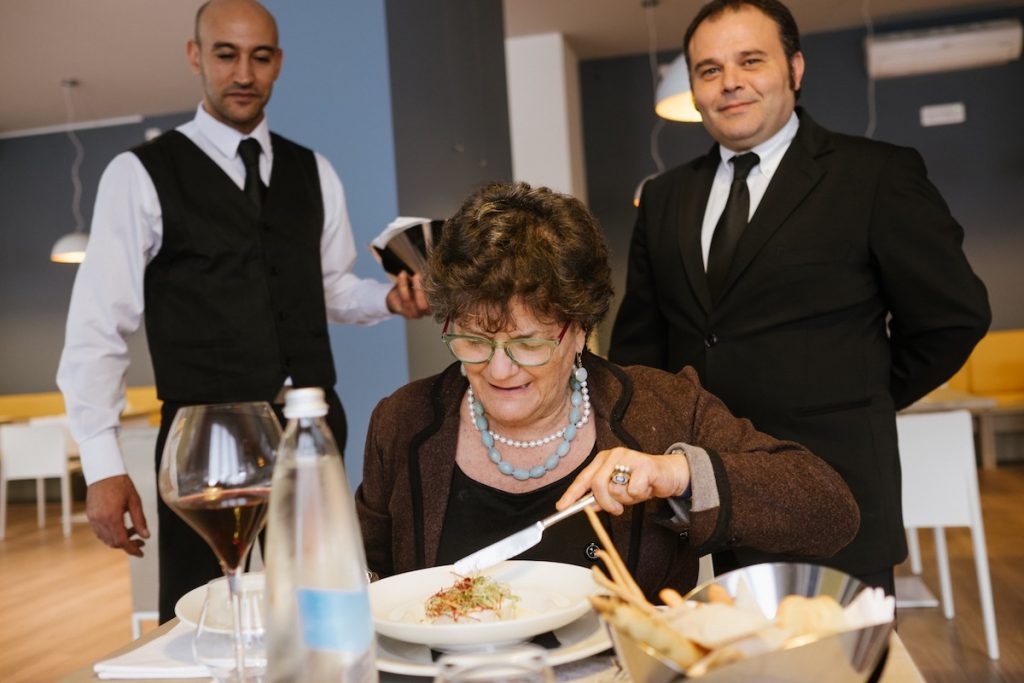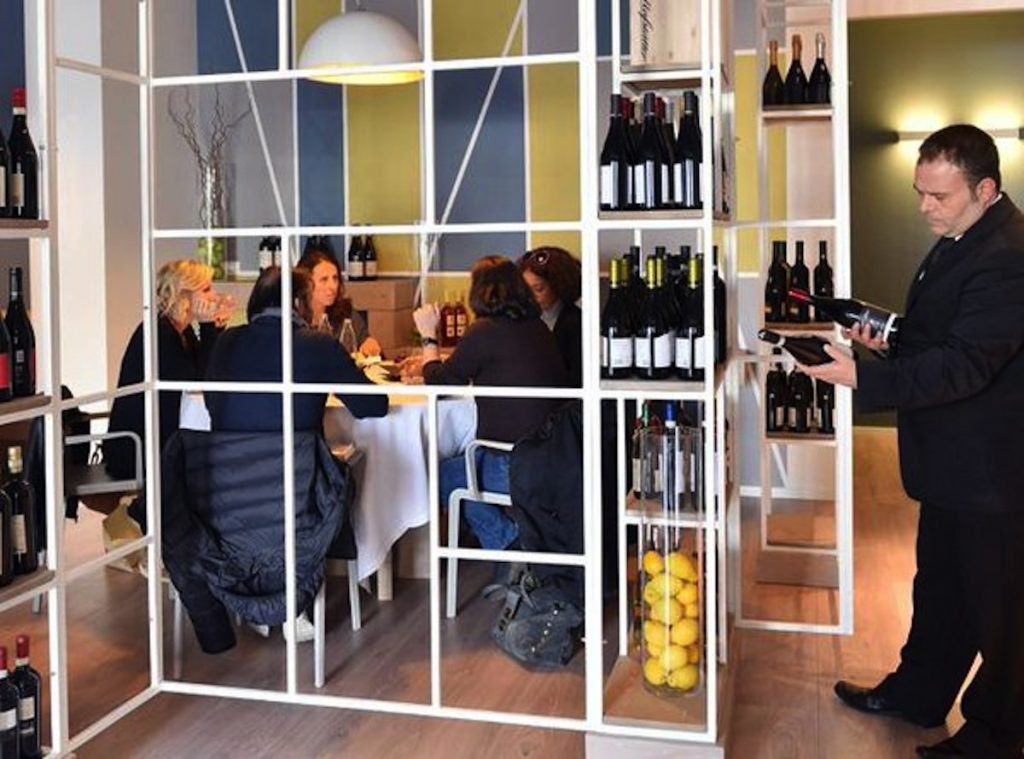‘Good evening, you’ve reached In Galera (in the jail)’
‘Hi, I would love to book a table tonight for 5, it’s for my wife’s birthday…’
You’re not reading a novel. Either, you’re not watching a futuristic TV series from another country.
Hello, you’ve called Bollate – Lombardy Region, Italy.
There is a restaurant where, excluded the maître, all the professionals working day by day are inmates who attended the trade school in jail and obtained an hotel and catering diploma thus being allowed to work in the catering industry exactly where they’re inmates.
In Galera is open for lunches and dinners but it is also catering for parties and events outside the jail. It is originated by a mature social responsibility project that dates back to 2004 and has been integrated on 2012 when a vocational Hotel and Catering school from the area of Bollate, the Istituto Alberghiero Paolo Frisi, engaged its faculty for a five years course finalized to get the inmates their diplomas and infield practices – the Istituto was already serving several learning courses in the past years.
Before the first inmates got their diplomas, last year a more ambitious project kicked off. Thanks to a gratuitous loan from the jail, the charity ABC Catering (helped by Good Point, a company dealing with social responsibility, by PwC and by funds of local sponsors such as public authorities and Fondazione Cariplo), opened the doors of the first restaurant in a jail in the world – In Galera. Not in a whichever jail, but in the most ‘starred’ jail of Italy, in Bollate, where there is a very advanced detention centre.
Today anyone, by reservation only, can eat there by sitting in very warm and cosy tables where the mise en place is a lovely A3 thick paper sheet printed with pictures of the prison. You can select among a good list of starters from 10 to 15 euros: the easy and local michetta bread with tripe; the Gallant (chicken galantine, mushrooms, ham and truffle paste); locally smoked salmon and sea bass. First and second courses, soups are seasonal as the entire menu. In this season you will find also the chocolate risotto plus seafood or meat choices. The dessert menu is very thrilling and seasonal too – as the other meals also the treats are ‘espressi’, that means cooked and finalized on the table of the fellow diners choosing them.
Are you looking for a quick lunch? They’ve created a special menu and there is also a tasting menu with a careful choice of small appetizers in order to discover the entire potentials of their signature.
The wine list has a price cap that Brits will define ‘affordable’ without forgetting a good variety, at least 2 choices, per terroir and also including a selection of bottles for the wealthiest or for those clients harder to please.
You can find everything about them, menus and wines included, on their EN/IT website.
There you’ll also discover that if you’re vegetarian or have celiac disease, you can still have good choices and, moreover, you can ask a tailored menu once reserving your seat.
To learn more about In Galera we called late in the night the lady beyond all this, Ms Silvia Polleri, who is also chairing ABC La Sapienza in tavola.
She is in the jail at the restaurant when picks up and just ends the previous call on the landline with some clients who reserved for the day after, she speaks in English, maybe they’re tourist.
Your story in a few lines until it met the Bollate Detention Centre that seems more engaged in rehabilitating inmates than any other prison in Italy
I’ve been a kinder garden pedagogue for 22 years. After this job, for a personal interest, I opened a small catering company dealing to treat the wealthy Milanese bourgeois families. And when I ended this business because I was on the point to retire, the director of Bollate Detention Centre asked me if I wanted to start a catering inside a jail, this jail. Here, in Bollate.
So, before that, I guess you’ve not had any correctional experience
Nothing, zero experiences. I had, of course, a lot of charity experiences but never in a detention centre. It was a field in which I had never employed myself or even thought about it!
As I can see, you’ve accepted the challenge without a single hesitation
You’ve well defined my work: it is a challenge. All along the first year of life for the social cooperative ABC, around midnight of each day I took the decision to resign in order to find little peace and some hours of sleep. The day after I was rehiring myself again (she smiles – this interview is taking place in facts at night time while she still works hard at In Galera and I am on my desktop where many different stories lay and we are many kilometres away each other). This is just a hint to give you an idea of the size of my task.
Was this project starting with yourself alone, isn’t it?
Alone in the sense that ABC is a social cooperative that I founded and of which I have been since the first day the president: together with me there were five internal officers and five inmates (then they were more along the years).
Many of the inmates would have ended their reclusion as the years passed
Of course: since 2004 to nowadays I had around 65/70 inmates who had a work period with me.
I should guess almost anyone with direct experiences in food design, processing or service?
No: many of them were people working in the food industry before committing a crime, especially those starting ABC. The kick of the entire project came from them. The director, who was knowing me already, contacted me in order to see if I was agreeing to start a catering in the jail because some inmates were asking her to do so. They were subjected to a long reclusion and were asking to continue their profession in some way. So the challenge has been in real terms originated by them. As time passed, we also faced people with no experience who needed to acquire it and others with some small experience in the field. We could define the process as a progression.
How many seats In Galera has and how many meals did you serve since the opening? Is every client special, isn’t it? I am convinced you have been able, until today, to trace a profile of your recurrent client. Are there also inmate families coming to eat there, maybe with a discount?
We have 52 seats. We fill them quite often at dinners while at lunches we have an average of 30/35 clients. We work also quite well at the brunch time.
I should say that alchemy with us and chez us are many and diverse. Maybe you reserve at us on the first time out of curiosity but straight after this yout curiosity is cemented and consolidated with a true appreciation of the meals and of our reception style (of which there are lots of positive rumours): this is what they evaluate us at the best.
We do not have a recurrent client, I should say. They arrive from any part of the world and this made me think that the society fears of what it is not seen and not known. This is true not only if referred to a jail. It is a defense instinct natural for human beings. The fact that people from any nationality, culture and age reserve here made me think that there was a real need to know a piece of world still sitting unknown.
We do not make any discount, in general. The restaurant is born for the society and the idea behind it is that the society has to enter and to gain services from a prison while it is usually the opposite (it is the society obliged to supply services to a detention centre).
Families are allowed to eat at the restaurant when they go out from the meetings with their beloved but not when they are working here. This is because Italian law is allowing a determined amount of hours for the talks among family members and inmates. If the prisoner comes here with their relatives, he will not respect the law.
We are very curious of your chefs…Who are they and which are the meals they love to design?
We improved a lot since last September. All our kitchen members are prisoners since then. We have a very high profile chef that was already very skilled before entering the jail so we are very proud that this project can walk on its legs by having in-house cooks. It also very important the workers do not have a professional gap in their curricula because they are prisoners.
I should say that the entire menu is very well finished, from the starter to the desserts, it is quite Mediterranean with strong twists. We have such a great variety among the starters and I even do not start to mention how marvellous is our risotto with chocolate, spinaches, cotechino! There are often some matches that I would define a little ribald that are on the contrary very calibrated and very well designed at the point to amaze very much the clients.
A last question on ABC before investigating your private self: can you tell us more about the relation with Good Point of Alessi’s family and how they helped you to build your ‘attractiveness’ in social responsibility?
I met Good Point because we already affirmed ourselves in this field – the catering – and they contacted us to bring our story to PwC as an example that was breaking the mould in the social charity sector. We were so recognized because we were used to work well even being a charity. So, Good Point asked us to try to challenge our life by opening a restaurant employing only prisoners.
We then searched for an entire year a restaurant out of the Bollate, in Milan. We found only very expensive spaces (they’re really downtown) or only very borderline ones (in very risky districts). I’ve always told my guys that they’d to work only in the high society districts (she frantically smiles to this joke that sounds really great but only in Italian language, and I smiled a lot with her too!)
A day, when World Expo was about to start just 50 meters from our door, we had the idea to ask to the jail management for a space inside the detention centre. If I rewind this story now, this choice has been the happiest.
If you check the small presentation under the chapter Welcome on our website, I wrote there that, at least ‘we’re trying’. We are first of all humble in telling everybody that we are doing something new and tiring: we take either the honours and joys as well as all the burdens of it.
As already mentioned earlier, you’re based in a very advanced detention centre…
This of course is important: we had the chance to do this here because Bollate is Bollate, we were not able to do anything similar in other jails. This said, I have two other experiences to tell you…
One is coming from Colombia. We’ve been welcoming two volunteers from the jail of Cartagena who will go to open their restaurant inside the prison soon.
Another is coming from Marassi (Genoa, Liguria Region): the jail is trying to open (I’ve been there recently) a street food activity. This idea sparkled in me because that jail is just attached to the soccer stadium. I am from Genoa and I know that since XIXth cent. Genoa appreciated this form of meals and already developed what we now call ‘street food’ vending. We cross the fingers they will succeed.
Which are the food and the drink you love? You can also choose among the In Galera menu
Even if I do not usually like desserts, I should tell you that our so called ‘variazione al rum’ (warm chocolate pie, caramel cigar, infusion) is terrific. You plunge a cannoli, or better a cigar filled of caramel-cream made after rum in a super soft chocolate cake with the hot centre. You also receive a small portion of hot rum. The chef always recommends holding the cigar with the hands as he explains ‘food has to be experienced by getting dirty’. He is right: it’s beautiful.
Another fantastic experience is the risotto I was telling you about before. You can’t imagine it if you do not taste.
A talent you have, the one you miss
I define myself ‘old, bastard and from a jail’. This is my real strength: fourteen years here, in the jail. Why bastard? It’s because I have such a rigour in respecting rules that I ask a lot from others.
My funny nickname here, invented by the guards, is ‘pitbull’ because I am very inflexible.
I think that we have to give rights and obligations to the people working with us because everyone needs the pride to belong to something. For instance, to belong to a good family we’ve built, to belong to a highly considered workplace. The pride to belong to something.
This pride arises only with a true job and with the daily sacrifice. All our prisoners get a normal salary and they’re hired with all the rights of someone who is free. This is matter of pride for them, also because they’ve money to send to the families. Society usually perceives inmates as parasites – passive beings, even if obligated to be so. The prisoner working with us is also becoming a taxpayer and in true facts he pays the same amount of taxes of who is free.
What did you learn from life until now?
A lot. This is because when you work in the jail the prisoner teaches to read life in a different way: when you’re out you see the life in a frontal perspective. As you have a very flat rendering of it – a screen. Here, inside, you cannot see life in the same perspective. Here it is full of depth, of slow gleaning and of different height. I learnt from this people to read life differently.
I also do not like pietism. It has to be very clear. Who is here had transgressed the rules and has to be correctly stopped for this. This said nobody gives me the right to strip life from people. Their dignity comes first.
That’s why a detention without dignity cannot be of any help
Detention has a sense only if we project it beyond. I always tell this to my guys. Especially when somebody claims about the hurdle of his detention, that’s often demanding. They paralleled their rehabilitation with judges, educators and teachers with the one they have with me.
‘You, madam, are different: we speak with you in a different way’, they say
‘I indeed take you as new men, without those heavy folders you brought with you once entered here after the end of the judicial trial. I can watch forward with you. And backward just a little, by bending the head on the shoulder to see where we got wrong in order to do not make it again.’ , I reply.
To rsvp or to better know In Galera
The Italian version of this interview, written by Diana Marrone, has been commissioned to Slow Words by Foundation Easy Care and has been published in a new column that Slow Words designs each month (until May 2017) for the Observatory of the ‘Social Cohesion Days’.


